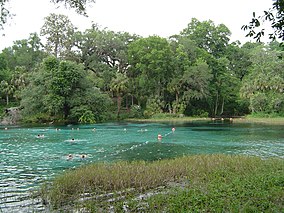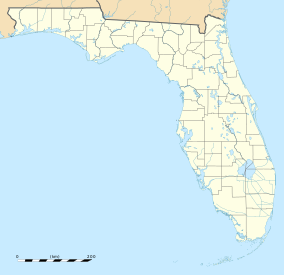Rainbow Springs State Park
| Rainbow Springs State Park | |
|---|---|
IUCN category V (protected landscape/seascape) | |
 Rainbow Springs | |
 | |
| Location | Marion County, Florida, USA |
| Nearest city | Dunnellon |
| Coordinates | 29°6′9.57″N 82°26′13.38″W / 29.1026583°N 82.4370500°WCoordinates: 29°6′9.57″N 82°26′13.38″W / 29.1026583°N 82.4370500°W |
| Area | 1,000 acres (4.0 km2) |
| Governing body | Florida Department of Environmental Protection |
| Designated | 1990 |


Rainbow Springs State Park is a Florida state park located on U.S. 41, 3 miles (5 km) north of Dunnellon, Florida. It comprises 1,459.07 acres (5.9046 km2) upland (which includes around 100 acres (0.40 km2) of wetlands) and 12.83 acres (51,900 m2) submerged. The most significant natural feature is the first-magnitude headspring basin, which produces up to 600,000,000 US gallons (2,300,000 m3) of fresh water per day, forming the Rainbow River. The looking-glass waters of Rainbow Springs come from several vents, not one large bubbling spring. The river itself supports a wide variety of fish, wildlife, and plants, many within easy viewing by visitors. In total, the park contains 11 distinct natural communities, including sandhills, flatwoods, upland mixed forests, and hydric hammocks.
Visitors are able to see a variety of wildflowers in season; oak, longleaf pines, magnolia, dogwood, red maple, redbud, cypress, sabal, and hickory trees; gray squirrels, red-shouldered hawks, swallowtail kites, barred owls, whitetail deer, and a wide variety of wading birds. The relative peace and quiet of the winter season offers much for the nature enthusiast. An interpretive room located in the visitor center displays the historical, natural, and cultural resources of the park.
History[]
Rainbow Springs became a privately owned theme park in the 1930s, where visitors could look out into the water at eye level in a sub-boat. In addition to waterfalls, a zoo, rodeo, gift shops, and a monorail were added. Due to the development of Florida's interstate highway system, the attractions in Orlando drew many people away from Rainbow Springs and other small towns that hosted similar attractions. As a result, Rainbow Springs closed in 1974. After years of being closed, Rainbow Springs later reopened as a state park in the 1990s. Residents of the area created a support organization for the park called the Friends of Rainbow Springs. By physically clearing paths and bringing life back to the gardens, this group helped lead the opening of the park.[1]
Geography[]
The Rainbow River flows from Rainbow Springs into the Withlacoochee River.
Ecology[]
Among the wildlife of the park are gray squirrels, otter, turtles, alligators, and many types of birds. Among the birds are songbirds, hummingbirds, red-shoulder hawks, and swallowtail kites, as well as ospreys, barred owls, and various water birds. The site has a 2-mile (3.2 km) nature trail.
Recreational activities and amenities[]
Activities include swimming, snorkeling, canoeing, kayaking, and wildlife viewing. Amenities include a nature trail, a full-service campground, a picnic area with pavilions, canoe and kayak rentals, and gardens, as well as access to the Rainbow River. It also has waterfalls and phosphate pits from former open-mining activity. A small zoo complex was once located in the gardens. Some of the facilities still exist, but are no longer used. At the entrance is a small visitor center, shop, snack bar, and restrooms, located in an elevated position above Rainbow Springs with a good view along the Rainbow River.
Hours[]
Florida state parks are open between 8:00 am and sundown every day of the year (including holidays).
References[]
External links[]
| Wikimedia Commons has media related to Rainbow Springs State Park. |
- IUCN Category V
- State parks of Florida
- Former zoos
- National Natural Landmarks in Florida
- Parks in Marion County, Florida
